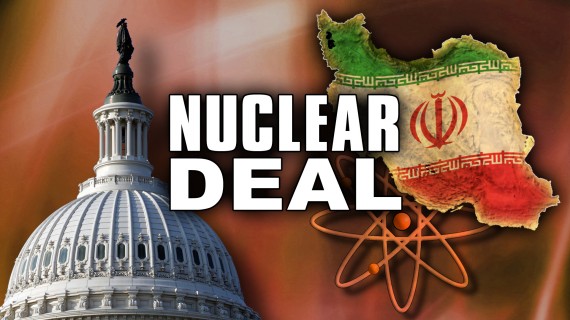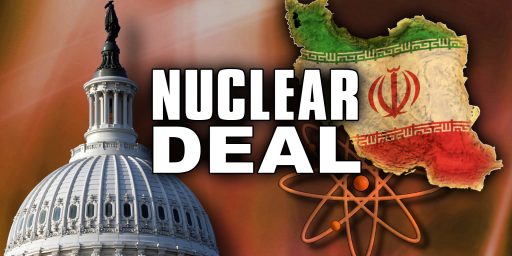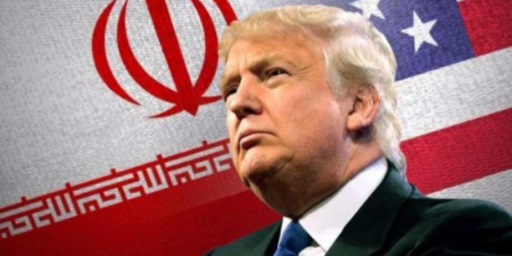Iran Nuclear Deal Now Virtually Certain To Survive Congressional Attack
Senate Democrats are now just one vote away from being able to block a veto override, meaning that the effort to block the Iran Nuclear Deal will most certainly fail.
Two more Democratic Senators came out in favor of the Iran Nuclear Deal today, meaning that President Obama is now virtually assured that Congressional efforts to derail the deal will fail:
The next “yes” vote will be the deciding vote for President Barack Obama’s Iran deal.
Two key Senate Democrats – Chris Coons of Delaware and Bob Casey of Pennsylvania – declared their support for the nuclear agreement on Tuesday, putting the Obama administration just one Senate vote away from blocking congressional attempts to kill the accord.
Coons, a key bellwether for Democrats on Iran, announced his position in a lengthy speech at the University of Delaware on Tuesday – saying that the potential consequences for U.S. allies, as well as the unlikelihood that negotiators could go back to secure a different outcome with Tehran, led him to reluctantly back the agreement.
“Thus, in a very hard choice between either rejecting the agreement and taking on the uncertainty and risks of compelling a return to sanctions and negotiations or a path that accepts the positives of this deal and attempts to manage and minimize the short and long term consequences of its flaws, I choose the latter,” Coons said.
Coons officially became the 33rdSenate Democrat to back the Iran deal, and Obama needs 34 to block any attempts to override his veto of legislation that would scuttle the deal. Earlier Tuesday, Casey came out in support of the Iran nuclear deal, becoming the 32nd Democrat to pledge support for the agreement.
A senior Obama administration official said: “We’ve always been confident this deal would be implemented. And this is another step in that direction.”
Casey announced his decision Tuesday afternoon after weeks of mulling the much-disputed deal with the longtime U.S. nemesis. His statement is 17 pages long, including more than a page of citations, and it goes through a range of concerns and objections raised by skeptics of the deal before essentially rebutting each one.
“I firmly believe that effective implementation of the [agreement], bolstered by other U.S. policies, including a strong deterrence policy of the U.S. and our partners, will be in our national security interest,” Casey writes. “This agreement will substantially constrain the Iranian nuclear program for its duration, and compared with all realistic alternatives, it is the best option available to us at this time.”
The Democrat, who writes that this was “one of the most difficult decisions of my public career,” isn’t without reservations about the deal. He says he’s skeptical that Iran will uphold its end of the bargain, and notes that the U.S. must be prepared to act in a worst-case scenario.
“The only effective deterrent to ultimately prevent or destroy an Iranian nuclear threat today, or 15 years from now, is the credible threat of a U.S. military strike to destroy any Iranian nuclear weapons infrastructure completely,” the senator writes.
But Casey also goes into the detail about the dozens of briefings, conversations and other engagements he has had in researching the agreement and its implications. He extensively cites some of the experts he has spoken to or read in discussing areas of concern, such as whether the U.S. can in the future use non-nuclear related sanctions to punish Iran for its regional mischief (he’s confident it can, but warns the U.S. cannot waver in its determination to do so).
Casey devoted a whole section to Israel, whose leadership is adamantly opposed to the agreement with the Islamist-led regime in Tehran. He cites at length assurances by U.S. officials, including President Barack Obama, that the Jewish-majority state’s security will remain a top priority. But he also notes, “It is crucial that our unwavering support for Israel and our commitment to further enhance Israel’s military capabilities only continue to strengthen.”
It’s been apparent for some time now that we would end up where we are now. While Republicans have the votes to pass a resolution disapproving of the deal in the House and, potentially, in the Senate (more about that below), it’s never seemed very likely that they would have enough votes to override President Obama’s expected veto of the resolution. In the House, that would require both complete Republican unity in an override vote and the support of at least 44 members of the House Democratic Caucus willing to override their President’s veto. In the Senate, it would require Republican unity plus at least 13 Senate Democrats willing to vote to override the veto. Given the fact that none of President Obama’s four vetoes to date have been overridden, and that a veto here would be seen as a tremendous rebuke of the President and a serious foreign policy defeat it was always unlikely that Republicans would get the votes they need. Now, with Democrats just one vote short of those who have officially declared their support for the deal, it seems certain the Republicans will fail.
According to The Washington Post’s projections, the deal’s fate seems to already be sealed. In addition to the 33 Senators that have already publicly expressed support for the deal, the Post lists two undeclared Democrats, West Virginia’s Joe Manchin and Connecticut’s Richard Blumenthal, as leaning yes based on their past comments on the deal. If those Senators do indeed come out in support of the deal, then Senate Democrats will reach 35 votes in favor of the deal and the debate will essentially be over. Still undecided with no indication of which way they are leaning are six other Democrats, including Senators such as New Jersey’s Cory Booker and Virginia’s Mark Warner. If Democrats are able to get at least five of those six undeclared Senators to vote with them, then they will have enough votes to block a Cloture Motion on the resolution against the deal, thus preventing the Senate from reaching a final vote and effectively killing the opposition to the deal. If the Senate is unable to vote on the resolution before the end of the 60 day period that began in mid-July, then the deal will be considered binding and Congress will be unable to stop it. However this unfolds, though, it seems fairly clear now that the efforts to stop the Iran nuclear deal will fail, the only question is how much Capitol Hill drama we’ll be subjected to before the end.







Awww….Republicans aren’t going to get to start another war of choice.
Which makes me wonder….have Republicans accomplished anything since taking over Congress?
The Republicans need some victories. The ACA, gay marriage, Benghazi, the Confederate flag,now this deal. A failure to deliver some wins will evaporate their support. The big money guys did not become big money guys by holding onto losing cards. Regular folks like winners better as well. Shutting down the government over Planned Parenthood or complaining about the name of a mountain in Alaska is weak sauce.
The USA needs a opposition party based on positions that are rational, sensible, and advance the country.
@Slugger:
No, but what a lot of them want is: low taxes on themselves and their businesses, generous government purchases and subsidies for their businesses, and no regulation of their businesses, especially nobody doing anything about AGW. They aren’t likely to get anyone sensible to vote for that program, so what choice do they have except to do what they’ve been doing, conning the rubes with religion and xenophobia. And they’re NOT losing. They have majorities in both Houses and a lot of state governments.
@Slugger:
Yes, that would be a nice change. I wonder where we can find one.
I see that some wingnut group has sent an email claiming Denali is Kenyon for black power.
@C. Clavin: Ah, my friend, this is exactly what the venomous commenters at Breitbart’s and Erickson’s websites will be saying. But they will be using the observation to justify crazier and crazier ‘remedies’. The refrain there is that ‘they told us they needed a Repub majority — we gave them their majority — what have they done with it?’
At the right-wing Foundation for Economic Education, a think tank (I suppose I can call it ‘thinking’) devoted to the ideas of Austrian economists, a gentleman named Jeffery Tucker looked into the Repub response to their legislative loses under Pres Obama and found — Donald Trump doing a Fascist act. If democracy doesn’t ‘work’, what do you do, eh?
http://www.fee.org/anythingpeaceful/trumpism-the-ideology/
@JohnMcC: Thank you for that link. Two points: First, I read three or so additional articles while I visited this one, and Tucker’s was the sane one. Which leads me to my second point: I have to keep siding with Mr. Reynolds on the point that Trump is not the cause or even the catalyst, he is the result of all of the flapdoodle that the right has been indoctrinating its minions with for the past 30 or 40 years. If he is leading the party toward fascism, conservatism has been pointing the way for a long time.
A bad idea just like the TransPacific Partnership. Makes me wonder just who our dopey President is working for. It seems he already has retired from reality.
@JohnMcC: @Just ‘nutha ig’rant cracker: @Robin Cohen: Interesting read. As long as he’s talking about Trump the nativist or Trump the fake religionist he has quotes and examples. Once he launches off into Trump the fascist it’s pure assertion. Assertion without supporting facts or argument. (Like @Robin Cohen: ) What strikes me as really odd, though, is that except for religion, he takes Trump at his word. Why would anyone do that?
Breaking…I guess….Obama now has the votes he needs to insure that sanity prevails on the Iran Deal.
On Wednesday morning Sen. Barbara Mikulski (D-Md.) became #34 in agreeing to support.
@C. Clavin:
This unprecedented nuclear proliferation agreement, and the implementation of a vigorous diplomatic agenda, pretty much cements Obama’s legacy as one of the most productive and effective Presidents……in history.
Suck on that for a while, Republicans.
As Sully would have typed…..Meep fwcking Meep.
@C. Clavin: Thanks. God news. Now we do a bunch of Kabuki around cloture, and maybe a veto, then our weak, disengaged, unable to deal with congress President Obama lucks out into getting what he wants.
Again.
@C. Clavin: I was just about to post a link to the TPM article.
Barbara Mikulski of Maryland is supporting the deal. Now every Nay vote is just campaign ad copy.
@C. Clavin:
Er…what Clavin said.
@C. Clavin:
Right about now Republicans are prepping their Neville Chamberlain companion dolls for an evening of merriment.